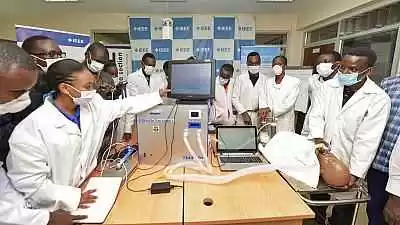

Last updated on September 11th, 2021 at 02:48 pm
African scientists, engineers and innovators have turned to homegrown solutions to prepare for the worst case scenario amid the COVID-19 pandemic disruption – which at a point brought much of the world to its knees.
By the time the virus hit Africa, where cases have risen slowly, images of overwhelmed hospitals and stories of health workers struggling for protective gear had been streaming in for weeks.
Over in Kenya, technology is on a mission to close the gap in seeking solutions. Prof. Nicholas K Gikonyo, Director of National Phytotherapeutics Research Centre of Kenyatta University weighs in on the need to not sit back – technologically.
“This globalisation means that we can have solutions made at source. Especially right now with the lockdown nothing is moving in, and it was very exciting to see that they can make it.”
A scientist from a 3D printing company in the capital Nairobi, said he and his partner Neeval Shah quickly realised they could be “first responders” in producing locally-made equipment.
In only three days they put together a working design for 3D-printed face shields made up of a visor that clips onto a plastic sheet. They currently produce around 500 a day.
Mehul Shah, is with Ultra Red Technologies, a 3D printing company: “Normally all the competitors would be competing against each other are all coming together.
“Our 3D printing network, we have actually all collaborated, all sharing one design, on all one costing method, and we are all producing the same thing so common goal is quite powerful here.”
The team is also helping produce components that would allow ventilators to be used on more than one patient, as well as printing parts for locally-made ventilators. Developers in Kenya’s thriving tech scene are among several on the continent working on contact tracing apps.
As of May 23, Kenya had recorded 1,192 cases with 51 deaths. “We are preparing for the worst case scenario,” Mehul said. According to him, all the companies are looking at how they can use their resources to help out.
(AFP)
EA Sports shows that Toronto Maple Leafs will stop their 58-year title wait by beating the Colorado Avalanche in seven…
Pope Francis, the first Latin American pope of the Roman Catholic Church, passed away in the morning of his 88th…
You want to pick a good film for weekend relaxation? Netflix South Africa provides customers with a wide range of…
The 2025 edition of AFCON will be hosted by Morocco which serves both the high-level competition and as a catalyst…
The Christian community marks Good Friday as its deepest holiday to remember when Jesus died at Calvary. The Christian community…
Art has the potential to take the talents from any regions across the globe, and this world has witnessed one…
This website uses cookies.